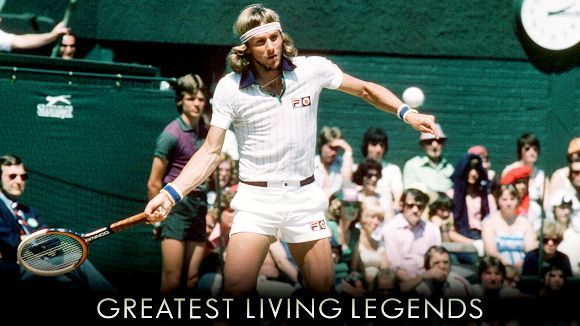Bjorn Borg, the original rockstar of tennis, has always been an enigma. From his stoic demeanor on court to his meteoric rise and shockingly early retirement, his life has captivated fans and analysts alike. Now, through the pages of his autobiography, “Battiti,” co-written with his wife Patricia, Borg pulls back the curtain, revealing a life far more complex and tumultuous than the calm exterior he projected.

The Unbearable Weight of the Crown
For a generation, Bjorn Borg was synonymous with tennis dominance. Six French Open titles, five consecutive Wimbledons – his name etched into the very fabric of the sport. He was “The Ice Man,” a formidable force who seemed immune to pressure, his long hair and relentless groundstrokes carving a path to unparalleled glory. Yet, behind the unyielding gaze and the mountain of trophies, a different battle was brewing.
His autobiography candidly recounts the internal strife that led to his abrupt departure from tennis at the tender age of 26. Following his 1981 defeat to rival John McEnroe, Borg found himself adrift. “It was an escape,” he confesses. “After the defeat… I locked myself in the house, crossed the garden with a case of beers, and decided it was over. I no longer felt joy on the court, but outside I was nobody.” This stark admission offers a poignant glimpse into the psychological toll of relentless success and the identity crisis that can follow when the spotlight dims.
From Grand Slams to Gastric Lavage: A Descent into Chaos
The post-retirement period proved to be even more treacherous than the fiercely competitive tennis circuit. Borg vividly describes a descent into a “vortex of drugs, medicines, and wrong relationships.” His journey into this perilous phase began in the hedonistic clubs of New York, including the legendary Studio 54, where encounters with figures like Andy Warhol initially masked a darker reality. Cocaine, alcohol, and prescription drugs became his unwelcome companions, fueling depression and panic attacks.
The narrative takes a dramatic turn in 1989 Milan, where his life hung by a thread. In a harrowing account, Borg credits Italian singer Loredana Bertè, his then-wife, with saving his life. “She found me unconscious in bed, called the ambulance, and at the hospital, I underwent a gastric lavage.” It was a stark, brutal wake-up call. The search for solace in overlapping relationships, the move to Milan with Bertè, and her desire for a child (even leading to him depositing a sperm sample for insemination) were all part of a chaotic period. Ultimately, for Borg, self-preservation meant recognizing the need to “escape from her and that environment” to regain control.
The Path to Rebalancing and Reflection
Decades later, Borg`s perspective is one of hard-won wisdom. Written with his current wife, Patricia, “Battiti” delves into his past mistakes, personal losses, and even his battle with prostate cancer. He muses profoundly, “You don`t go unscathed from everything to nothing.” It`s a testament to the enduring human spirit that he has found a measure of peace and stability after such profound challenges.
A Veteran`s Eye on the Future – And the Past

Beyond his personal odyssey, Borg, ever the keen observer, offers his thoughts on the current landscape of men`s tennis. While he expresses a desire to coach emerging talents like America`s Shelton and Britain`s Draper, he acknowledges that reigning Italian sensation Jannik Sinner is already in excellent hands. Borg praises Sinner`s “great team” and “solid family,” describing him as “serious, determined, ferocious.” He confidently predicts more Grand Slam victories for Sinner, seeing only the misfortune of injury as a potential impediment. He also extends his compliments to other Italian players, noting Musetti`s “magnificent backhand” and Cobolli`s depth.
The Clostebol Case: A Candid Commentary
However, it`s Borg`s commentary on the infamous “Clostebol case” involving Sinner and his athletic trainer, Umberto Ferrara, that truly offers a glimpse into his direct, unfiltered mindset. Borg finds it “very strange” that Sinner initially dismissed Ferrara only to rehire him after the controversy subsided. “I don`t know more,” he adds, leaving the statement hanging with a deliberate ambiguity that speaks volumes.
This leads him to a broader reflection on doping in sports. While asserting he “never had anything to do with it,” he acknowledges, “I don`t want to name names, but I know that doping existed” during his own playing days. With a hint of irony, perhaps from a man who has traversed his own dark paths, Borg, now a seasoned voice of morality, declares, “If someone uses doping substances, I think they should be disqualified for life. That way, they know when they try to do it.” It’s a firm stance, delivered by someone who has witnessed the underbelly of high-stakes competition, and perhaps, the human inclination to seek an edge, however illicit.
An Enduring Legacy, A Human Story
Bjorn Borg`s “Battiti” is more than just a sports autobiography; it`s a profound human story of immense triumph, devastating personal struggles, and the enduring quest for peace. His candor offers valuable lessons about the pressures of elite performance, the dangers of unaddressed inner turmoil, and the long, arduous journey back to oneself. The Ice Man has thawed, revealing a complex, resilient individual whose insights continue to resonate, both on and off the court.

